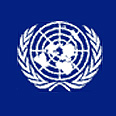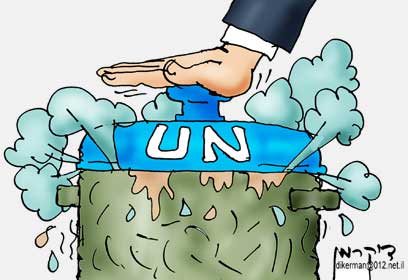
Putting force into peace-keeping forces
Despite an anticipated increase of over 10 thousand soldiers, UN troops in south Lebanon will not be useful without a significant mandate change
While overjoyed at the prospect of a cessation of violence, I could not help but find the description of the proposed multinational force discordant with the desired reality. This is because the suggested force is merely an addition - albeit of 13,000 troops - of UN forces to the existing UN organization in the area: UNIFIL (UN Interim Forces in Lebanon).
Regardless of an increase in force of 13,000 or even 30,000, UNIFIL forces in the area will simply not be a factor in effective peace-keeping unless they are given the power to enforce – implied: militarily force – the demands of the latest UN resolution. This power will be sorely lacking barring a major overhaul of the organization’s existing mandate.
Useless
UNIFIL was founded in 1978 and had its mandate renewed several times until the present day, in order to execute three primary objectives: “withdrawal of Israeli forces from Lebanon, restoring international peace and security, and assisting the government of Lebanon in ensuring the return of its effective authority in the area” (UN official website). Unfortunately, UNIFIL’s mandate - as an observation force - did not give it the necessary tools to actually carry out, in entirety, any of these three objectives.
Prior to the current crisis, UNIFIL’s activities regarding maintenance of an Israel-Lebanon ceasefire were limited to patrols, observation from a fixed position and close contact with the parties. In other words, they had (and have) no actual jurisdiction to address problems or violence, other than merely observing them. Not surprisingly, UNIFIL failed to enforce any of the objectives, a fact clearly illustrated by continuous outbreaks of violence in the region.
At no point during its decades-long mandate, and despite a varying security situation, did UNIFIL actively intervene to prevent renewed conflicts. During violent times, UN personnel continued to conduct humanitarian assistance to the best of their ability, but, due to the lack of jurisdiction afforded to them by their mandate, did nothing to enforce a cessation of such violence.

Illustration by Boris Dikerman
This is most vividly noted by their inability to stop PLO attacks on Israel for the first few years following their inception or to prevent the subsequent 18 year war that ensued. Israel, for instance, withdrew from Lebanon after a government decision, and not as a result of any action of the UN force.
UNIFIL is decidedly useless in curbing the behavior of militant groups in areas in which it is purportedly responsible and against the behavior of sovereign governments, if these parties decide to act in opposition to UN-desired behavior.
They cannot keep the peace
For example, a short while after Israeli withdrawal from Lebanon in 2000, in January 2001, the Secretary-General confirmed that UNIFIL “assisted, to the extent it could, the Lebanese authorities to the area vacated by Israel” but added that “UNIFIL cannot, of course, compel the Lebanese government to take the final step and deploy its personnel down to the Blue Line.” Additionally, by the Secretary-General’s own admission, the organization had no control in areas where Lebanese forces had deployed.
By natural extension, under the current mandate, UN troops still cannot prevent renewed Hizbullah attacks and, subsequently, cannot, in practice, help ensure Lebanese state sovereignty in south Lebanon if the Lebanese government doesn’t decide, on its own, to take military charge of the area. The most they can do is serve as a UN watchdog and report to UN headquarters, hoping that the United Nations will, at best - based on their actions historically - reprimand the Lebanese government and encourage them to take care of their own sovereign territories.
Indeed, this phenomenon was most recently manifested in the current conflict. In his July 2006 report of UNIFIL, covering the period from January 21st to July 18th of the same year, Kofi Annan was quoted as saying that the events of July 12th had radically changed the context in which the mandate operated and that “in the current environment, circumstances conducive to United Nations do not exist.” In other words, in a time of crisis, the requisite circumstances for a UN force to function are absent. How then, is such a force supposed to actually keep peace? Clearly, it cannot.
As things stand, increased numbers of UNIFIL forces may be useful in fulfilling the humanitarian and rehabilitation aspects of the proposed UN resolution, but they certainly do not address the more important peace-keeping objectives of the document. Based on the current mandate, UNIFIL forces can do nothing more than observe a situation falling to pieces and report on it post-mortem.
So how will the proposed multinational force deal with the threat of renewed violence in the region? How would it deal with the goal of disarming militias (e.g. – Hizbullah)? Without a fundamental change in the nature of the UN force itself, the newest peace-keeping efforts will be nothing more than the same old story of observation and announcement: Israel, your north just got hit. Twice.
Noa Levanon was formerly a lieutenant in the IDF's Strategic Planning and International Cooperation Division, which is responsible for collaboration and coordination with foreign militaries and peace-keeping forces in Israel










